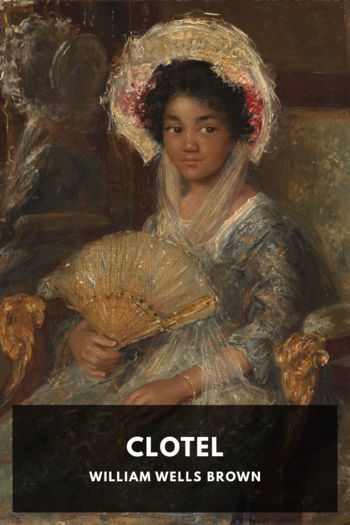Clotel, William Wells Brown [i like reading books .txt] 📗

- Author: William Wells Brown
Book online «Clotel, William Wells Brown [i like reading books .txt] 📗». Author William Wells Brown
By William Wells Brown.
This ebook is the product of many hours of hard work by volunteers for Standard Ebooks, and builds on the hard work of other literature lovers made possible by the public domain.
This particular ebook is based on a transcription produced for Project Gutenberg and on digital scans available at Google Books.
The writing and artwork within are believed to be in the U.S. public domain, and Standard Ebooks releases this ebook edition under the terms in the CC0 1.0 Universal Public Domain Dedication. For full license information, see the Uncopyright at the end of this ebook.
Standard Ebooks is a volunteer-driven project that produces ebook editions of public domain literature using modern typography, technology, and editorial standards, and distributes them free of cost. You can download this and other ebooks carefully produced for true book lovers at standardebooks.org.
Preface to the 1853 EditionMore than two hundred years have elapsed since the first cargo of slaves was landed on the banks of the James River, in the colony of Virginia, from the West coast of Africa. From the introduction of slaves in 1620, down to the period of the separation of the Colonies from the British Crown, the number had increased to five hundred thousand; now there are nearly four million. In fifteen of the thirty-one States, Slavery is made lawful by the Constitution, which binds the several States into one confederacy.
On every foot of soil, over which Stars and Stripes wave, the negro is considered common property, on which any white man may lay his hand with perfect impunity. The entire white population of the United States, North and South, are bound by their oath to the Constitution, and their adhesion to the Fugitive Slave Law, to hunt down the runaway slave and return him to his claimant, and to suppress any effort that may be made by the slaves to gain their freedom by physical force. Twenty-five millions of whites have banded themselves in solemn conclave to keep four millions of blacks in their chains. In all grades of society are to be found men who either hold, buy, or sell slaves, from the statesmen and doctors of divinity, who can own their hundreds, down to the person who can purchase but one.
Were it not for persons in high places owning slaves, and thereby giving the system a reputation, and especially professed Christians, slavery would long since have been abolished. The influence of the great “honours the corruption, and chastisement doth therefore hide his head.” The great aim of the true friends of the slave should be to lay bare the institution, so that the gaze of the world may be upon it, and cause the wise, the prudent, and the pious to withdraw their support from it, and leave it to its own fate. It does the cause of emancipation but little good to cry out in tones of execration against the traders, the kidnappers, the hireling overseers, and brutal drivers, so long as nothing is said to fasten the guilt on those who move in a higher circle.
The fact that slavery was introduced into the American colonies, while they were under the control of the British Crown, is a sufficient reason why Englishmen should feel a lively interest in its abolition; and now that the genius of mechanical invention has brought the two countries so near together, and both having one language and one literature, the influence of British public opinion is very great on the people of the New World.
If the incidents set forth in the following pages should add anything new to the information already given to the public through similar publications, and should thereby aid in bringing British influence to bear upon American slavery, the main object for which this work was written will have been accomplished.
W. Wells Brown
22, Cecil Street, Strand, London.
Narrative of the Life and Escape of William Wells BrownShall tongues be mute when deeds are wrought
Which well might shame extremest Hell?
Shall freemen lack th’ indignant thought?
Shall Mercy’s bosom cease to swell?
Shall Honour bleed?—shall Truth succumb?
Shall pen, and press, and soul be dumb?
William Wells Brown, the subject of this narrative, was born a slave in Lexington, Kentucky, not far from the residence of the late Hon. Henry Clay. His mother was the slave of Doctor John Young. His father was a slaveholder, and, besides being a near relation of his master, was connected with the Wicklief family, one of the oldest, wealthiest, and most aristocratic of the Kentucky planters. Dr. Young was the owner of forty or fifty slaves, whose chief employment was in cultivating tobacco, hemp, corn, and flax. The Doctor removed from Lexington, when William was five or six years old, to the state





Comments (0)